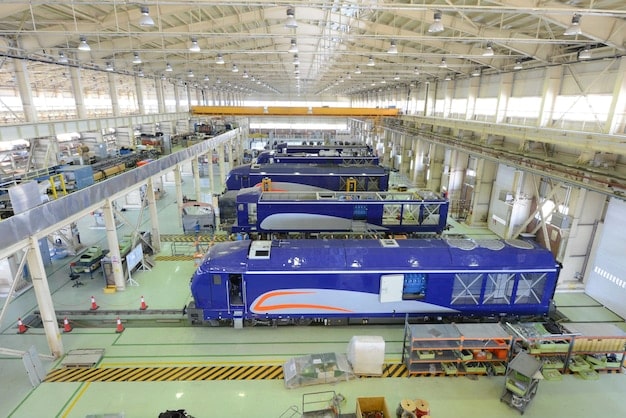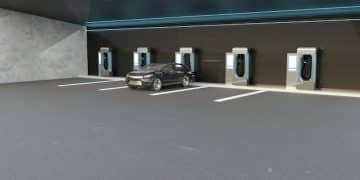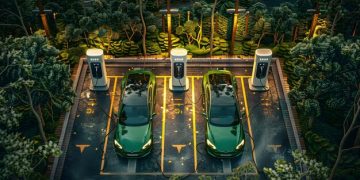Electric Vehicle Job Growth: 50,000 New US Jobs in Past Year

Electric Vehicle (EV) job creation in the US has surged, with the sector adding 50,000 new jobs over the past year, indicating substantial growth and investment in electric vehicle technology and infrastructure within the United States.
The electric vehicle (EV) sector in the United States is experiencing remarkable growth, not only in vehicle sales and technological advancements but also in **electric vehicle job creation**. Over the past year, the sector has added 50,000 new jobs, underscoring the increasing demand for skilled workers and the expanding footprint of the EV industry within the US economy. This surge in employment reflects a broader trend towards sustainable transportation and the electrification of the automotive industry.
Electric Vehicle Job Creation in the US: An Overview
The rapid growth of the electric vehicle sector in the United States is generating substantial employment opportunities across various industries. From manufacturing and engineering to infrastructure development and sales, the demand for skilled workers in the EV domain is soaring. This expansion signifies a crucial shift in the automotive landscape, with significant implications for the US job market.
Manufacturing and Assembly Jobs
One of the primary areas of job creation within the electric vehicle sector is manufacturing and assembly. As automakers ramp up production of electric vehicles, there is a growing need for skilled workers to assemble vehicles, manufacture components, and manage production processes.
Engineering and Research Positions
In addition to manufacturing, the EV sector is also creating numerous opportunities in engineering and research. Companies are investing heavily in developing new EV technologies, requiring engineers and researchers to innovate in areas such as battery technology, electric motors, and charging infrastructure.
- 🔋 Battery technology research and development.
- 🔌 Charging infrastructure design and installation.
- 🚗 Electric motor manufacturing and maintenance.
- 💻 Software and hardware engineering for EV systems.
The growth of electric vehicle job creation is a testament to the increasing importance of sustainable transportation and the shift towards a greener economy. As the industry continues to expand, it is expected to generate even more employment opportunities in the years to come, benefiting workers, communities, and the environment.

The Impact of Federal Policies on EV Employment
Federal policies play a crucial role in shaping the trajectory of electric vehicle job creation in the United States. Government initiatives, such as tax incentives, subsidies, and regulatory frameworks, can significantly influence the demand for EVs and, consequently, the employment opportunities within the sector. Understanding these policies is essential for assessing the future prospects of EV-related jobs.
Tax Incentives and Consumer Adoption
Tax incentives for electric vehicle purchases can stimulate consumer demand, leading to higher production volumes and increased employment in manufacturing and sales. These incentives make EVs more affordable for consumers, encouraging them to switch from traditional gasoline-powered vehicles.
Infrastructure Development and Government Funding
Government funding for charging infrastructure development is another critical factor influencing EV job creation. As the number of EVs on the road increases, there is a growing need for accessible and reliable charging stations, creating employment opportunities in installation, maintenance, and operation.
- 💰 Government subsidies for EV manufacturing.
- 📜 Regulatory standards promoting EV adoption.
- 🔌 Investments in nationwide charging networks.
- 🤝 Public-private partnerships for EV innovation.
Federal policies are instrumental in driving the growth of the electric vehicle sector and fostering job creation. By incentivizing consumer adoption, supporting infrastructure development, and promoting technological innovation, the government can play a significant role in shaping the future of EV employment in the US.
Regional Distribution of Electric Vehicle Jobs
The distribution of electric vehicle jobs across the United States is not uniform. Certain states and regions are emerging as hubs for EV manufacturing, research, and development, attracting significant investment and creating substantial employment opportunities. Factors such as government policies, infrastructure availability, and the presence of automotive industry clusters influence the regional distribution of EV jobs.
California: A Leader in EV Adoption and Employment
California has been at the forefront of electric vehicle adoption in the United States, driven by its progressive environmental policies and strong consumer demand. As a result, the state has also become a major center for EV-related employment, with numerous companies involved in manufacturing, research, and sales operations.
The Midwest: Revitalizing Automotive Manufacturing
The Midwest, traditionally known as the heartland of the US automotive industry, is also experiencing a resurgence in electric vehicle job creation. Automakers are investing in new EV production facilities in states like Michigan, Ohio, and Indiana, revitalizing the region’s manufacturing base and creating thousands of jobs.
- 🏢 EV manufacturing plants in Michigan and Ohio.
- 🧪 Research and development centers in California.
- 🔌 Charging infrastructure projects in the Northeast.
- 🔋 Battery production facilities in Nevada and Arizona.
The regional distribution of electric vehicle jobs reflects the diverse strengths and opportunities across the United States. By leveraging existing automotive industry clusters, investing in infrastructure development, and implementing supportive policies, different regions can contribute to the overall growth of the EV sector and the creation of high-quality employment opportunities.

Skills and Training for Electric Vehicle Jobs
The electric vehicle sector requires a diverse set of skills and expertise. As the industry continues to evolve, there is a growing need for workers with specialized training in areas such as electric vehicle technology, battery management systems, and charging infrastructure. Investing in skills and training programs is crucial for ensuring that the workforce is well-prepared to meet the demands of the EV sector.
Technical Skills and Engineering Expertise
Technical skills and engineering expertise are in high demand within the electric vehicle sector. Workers need to have a solid understanding of electrical systems, electronics, and mechanical engineering to design, manufacture, and maintain electric vehicles and related components.
Software and Data Analytics Skills
In addition to technical skills, software and data analytics skills are also becoming increasingly important in the EV sector. Electric vehicles rely on sophisticated software systems for vehicle control, battery management, and connectivity, creating opportunities for software engineers and data analysts.
- 🛠️ Technical certifications in EV maintenance.
📚 Vocational training programs for EV technicians.
🎓 University programs in electric vehicle engineering.
💻 Online courses in battery management systems.
Investing in skills and training programs is essential for ensuring that the workforce is well-prepared to meet the demands of the electric vehicle sector. By providing workers with the necessary knowledge and expertise, these programs can contribute to the overall growth and competitiveness of the industry, while also creating pathways to high-quality employment opportunities.
Economic Benefits of Electric Vehicle Job Creation
The economic benefits of electric vehicle job creation extend far beyond the direct employment numbers. The expansion of the EV sector can stimulate economic growth, attract investment, and foster innovation across various industries. Understanding these broader economic impacts is essential for assessing the full value of EV-related jobs.
Stimulating Economic Growth
The electric vehicle sector stimulates economic growth by creating demand for goods and services across various industries. From raw materials and components to manufacturing equipment and software, the EV sector relies on a complex supply chain that supports numerous businesses and jobs.
Attracting Investment and Innovation
The expansion of the electric vehicle sector attracts investment and fosters innovation in areas such as battery technology, charging infrastructure, and autonomous driving. Companies are investing billions of dollars in EV-related research and development, leading to technological breakthroughs and new business opportunities.
- 📈 Increased tax revenues from EV-related industries.
💰 Attracting foreign direct investment in EV manufacturing.
💡 Fostering a culture of innovation and entrepreneurship.
🌎 Enhancing the competitiveness of the US economy.
Electric vehicle job creation generates significant economic benefits that extend beyond the direct employment numbers. By stimulating economic growth, attracting investment, and fostering innovation, the EV sector can contribute to a more prosperous and sustainable future for the United States.
Future Trends in Electric Vehicle Employment
The future of electric vehicle employment is poised for continued growth, driven by factors such as increasing consumer adoption, technological advancements, and supportive government policies. New trends are expected to emerge, shaping the skills and expertise required for EV-related jobs. Staying abreast of these trends is essential for workers and businesses looking to capitalize on the opportunities within the EV sector.
Autonomous Driving and Software Integration
The integration of autonomous driving technologies into electric vehicles is expected to create new employment opportunities for software engineers, data scientists, and robotics specialists. As EVs become more autonomous, there will be a growing need for skilled workers to develop and maintain the software systems that enable self-driving capabilities.
Battery Recycling and Sustainable Manufacturing
As the number of electric vehicles on the road increases, there will be a growing need for battery recycling facilities and sustainable manufacturing processes. This will create new employment opportunities for workers with expertise in materials science, environmental engineering, and waste management.
- 🔄 Growth in battery recycling and repurposing jobs.
🤖 Increased demand for automation and robotics specialists.
🚗 Expansion of electric vehicle charging infrastructure.
🔋Emergence of new business models in the EV sector.
The future of electric vehicle employment is bright, with continued growth and new trends shaping the industry. As consumer adoption increases, technology advances, and government policies remain supportive, the EV sector is poised to generate even more employment opportunities in the years to come, benefiting workers, communities, and the environment.
| Key Point | Brief Description |
|---|---|
| 📈 EV Job Growth | 50,000 new jobs added in the US EV sector in the past year. |
| 🏭 Manufacturing Hubs | Midwest states like Michigan and Ohio are revitalizing automotive manufacturing with new EV plants. |
| ⚡ Skills Demand | Growing need for specialized training in electric vehicle technology and battery management systems. |
| 🔄 Future Trends | Battery recycling, autonomous driving tech integration, and software skills are gaining importance. |
Frequently Asked Questions (FAQ)
▼
The electric vehicle sector in the United States has added approximately 50,000 new jobs over the past year. This growth highlights the increasing significance of the EV industry.
▼
Manufacturing and assembly, engineering, and research are experiencing substantial job growth. These areas are pivotal for EV production and technological advancement.
▼
Federal policies, such as tax incentives and infrastructure development funding, significantly influence EV demand and job creation. These policies encourage consumer adoption.
▼
Technical skills, software and data analytics, and engineering expertise are highly sought after. The industry requires diverse skills to innovate battery management and connectivity.
▼
Future trends include the integration of autonomous driving, battery recycling, and sustainable manufacturing. These areas will create opportunities for specialized jobs in the EV sector.
Conclusion
In conclusion, the electric vehicle sector is not only revolutionizing the automotive industry but also creating significant employment opportunities in the United States. With 50,000 new jobs added in the past year and continued growth expected, the **electric vehicle job creation** presents a promising future for workers, communities, and the environment. As the industry evolves, it is essential to invest in skills and training programs, foster innovation, and implement supportive policies to ensure that the US remains a leader in the global EV market.





